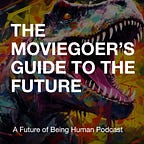Chapter 10 of Films from the Future: The Technology and Morality of Sci-Fi movies, read by author Andrew Maynard
In this episode: The Man in the White Suit
There’s Plenty of Room At The Bottom | Mastering the Material World | Myopically Benevolent Science | never Underestimate the Status Quo | It’s Good to Talk
Each year, I teach a class on responsible innovation based on the 1951 film The Man in the White Suit. And each time I teach it, I brace myself for a barrage of negative student reactions at having to watch something so old. Yet time after time I’m blown away by how much my students enjoy it!
This, of course, is a testament to how good story telling transcends time and technologies. But it’s also a reflection of just how relevant to today the story that The Man in the White Suit spins is.
As I mentioned in my previous post, The Man in the White Suit is, at heart, a tale of a well meaning but desperately naive and myopic scientist (played by Alec Guinness) who firmly believes that his vision of the future is one that everyone else shares. Unfortunately, this is a vision where having to own more than one set of clothes is a burden that he feels everyone should be liberated from.
As you can imagine, this isn’t a vision of utopia that’s widely shared, and despite Guinness’ character’s genuine desire to do good, things don’t pan out as he expects — in large part because he didn’t think to engage with the people his work impacted, and instead chose to assume he knew what their needs, wants, and values were without bothering to ask them.
Watched with an appropriate guide (and here I would quite shamelessly say that this podcast is such a guide), The Man in the White Suit provides quite compelling insights into the importance and benefits of public engagement when it comes to emerging technologies. I’d go so far as to suggest that anyone who’s serious about being in the business of developing new technologies should watch it and learn from it (and just to make this easier, Apple, Amazon, YouTube and Google all stream it).
Alternatively, you can listen to this episode of The Moviegoer’s Guide to the Future podcast — or read the transcript!
Before you do though, it’s worth noting that this episode also takes a deep dive into nanotechnology. This may seem like a bit of a diversion from the theme of public engagement and tech innovation — as well as being a rather more contemporary technology than the polymer science that’s depicted in the movie. And yet, as the episode elaborates, there are deep parallels between the story in the film and modern day nanoscale science and engineering — including the role of public engagement in ensuring the emergence of safe and beneficial technologies.
Plus, who doesn’t enjoy a bit of nanotech insider baseball?
About Films from the Future: I started writing Films from the Future in 2017. The intent was to explore the deeply complex landscape around emerging technologies, the future, and socially responsible innovation, in a way that would be accessible to most readers, and at the same time provide nuanced and important insights that weren’t available anywhere else.
One of the challenges with most books about tech and the future is that they take a polarized stance — we’re either all going to die unless we do something different, or technology is going to save the world. These sell — people love reading about extremes. But they’re not that helpful when it comes to navigating a deeply complex tech innovation landscape where there few right and wrong answers, where it’s important to weave together insights from many different areas of expertise — including the arts and humanities, and where dialogue and discussion are far more important than preaching.
And so I set out to write about emerging and converging technologies in as inclusive and accessible a way as I knew how, with the aim of taking readers on a compelling journey into the future where their thoughts and ideas were just as important as mine.
The result was a book that uses movies as a way to open up conversations about what responsible innovation means in a world that’s changing faster than ever before, and where new technologies are transforming how we think about the future and what it holds.
Of course some of the technologies it covers have moved on since I started writing the book. But at the end of the day this is not a book about science fiction movies, or about specific technologies, but about how all of us can think differently about our roles in ensuring the future we’re building is better than the past we leave behind.
I hope you enjoy these recordings of me narrating it — this is a book that reflects my voice quite deeply in the writing, and so it only made sense for me to one day actually read it aloud!
For more information on the book, visit https://andrewmaynard.net/films-from-the-future/











